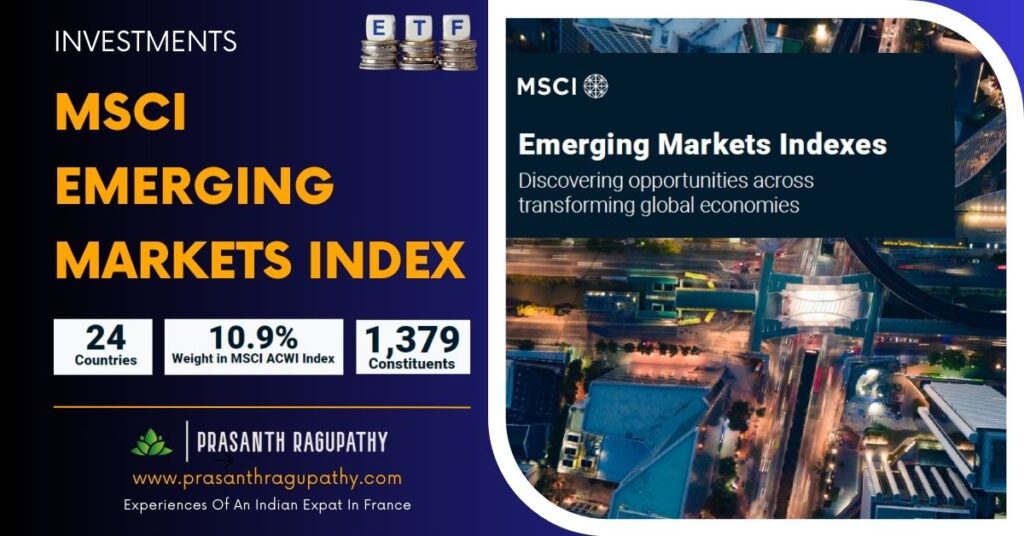An ETF (Exchange Traded Fund) is a basket of investment options such as stocks, bonds, commodities like gold, etc. It allows buying a group of stocks in a single transaction, without the need to buy these stocks individually. ETFs are known for their very low expense ratios and broker commissions.
This article focuses on MSCI Emerging Markets Index and the ETFs replicating the index.
This article focuses on the investors in France and Europe. However, a lot of information is generic and might be applicable outside Europe too.
1. What is a MSCI Emerging Markets Index ?
The MSCI Emerging Markets Index, launched in 1988, is a well known benchmark which measures the performance of equity markets across 24 developing countries, which is nearly 11% of the global investable equity market. It currently consists of around 1,400 large and mid-cap companies from these emerging economies, with China accounting for 30% of them.
The MSCI EM Index has a weightage of 10.9% in the MSCI ACWI Index (All Country World Index).
The index is based on the MSCI Global Investable Indexes (GIMI) Methodology and invests in the following countries.
- AMERICAS – Brazil, Chile, Colombia, Mexico and Peru.
- EMEA – Czech Republic, Egypt, Greece, Hungary, Kuwait, Poland, Qatar, Saudi Arabia, South Africa, Turkey and United Arab Emirates.
- APAC – China, India, Indonesia, Korea, Malaysia, Philippines, Taiwan and Thailand.
You can find the top-10 stocks, sector-wise, country-wise allocations in the charts below, as in December 2023.
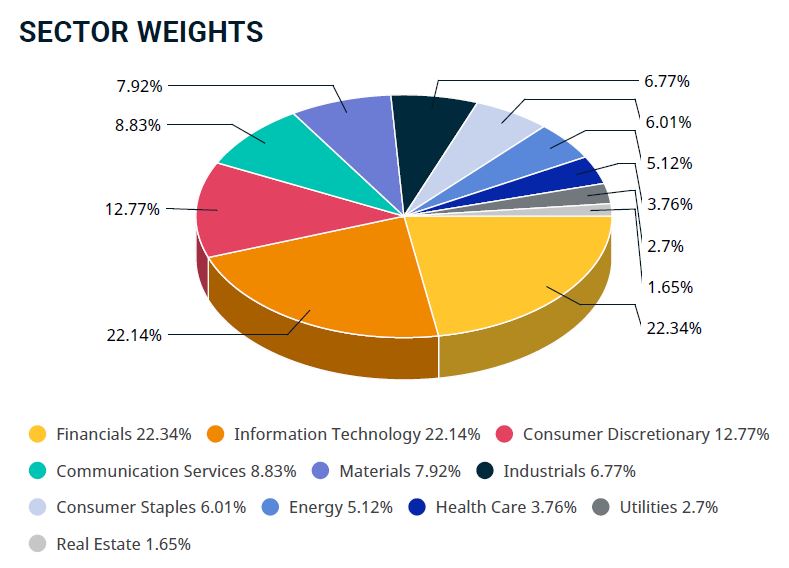
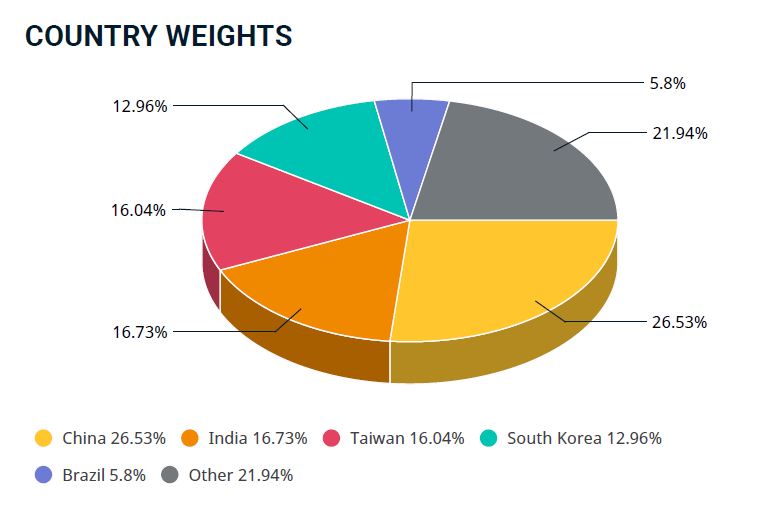
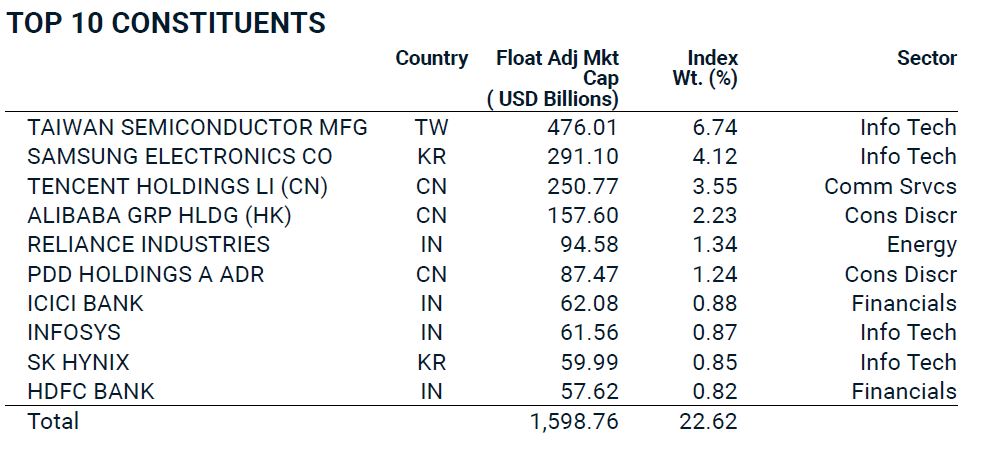
2. MSCI EM Index’s performance ?
The MSCI Emerging Markets index has given an annualized gross return of 5.35% in the last 10 years and 8.14% since inception on 31st Dec 1987. You can refer the Factsheet (EUR) for more details.

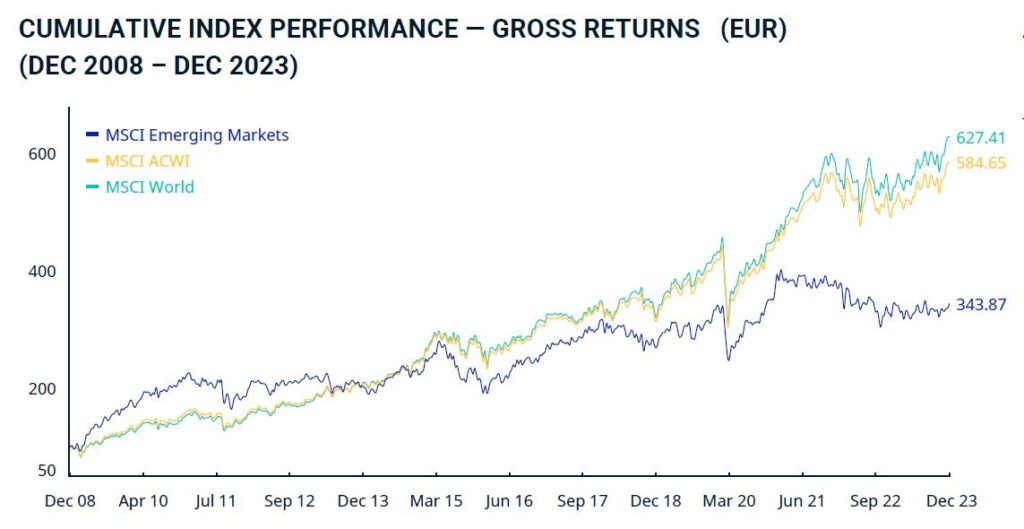
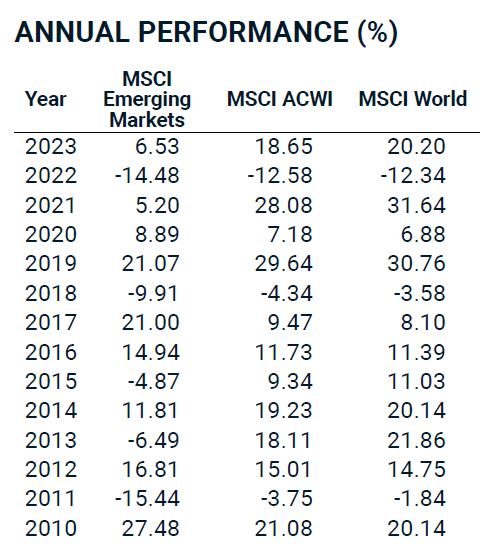
3. How to invest in MSCI EM Index ?
There are multiple ETFs which track the MSCI EM Index. These ETFs invest in the stocks, which are part of the index. So, the performance of the ETFs should be very close to its benchmark index. A concept known as tracking error measures the deviation in performance of the ETF and its index. So, you should choose the ETFs with the lowest tracking error.
Various assets management companies such as Amundi, Blackrock (iShares), Invesco, etc have their MSCI World ETF versions.
4. Which MSCI EM Index ETF to invest?
There are normally 2 types of ETFs,
- Accumulating (ACC) / Capitalisation (C): Dividends are reinvested automatically.
- Distribution (Dist) / Distribuant (D or DR): Dividends are paid to the investors.
It is highly recommended to invest in the accumulating ETFs, so the dividends are reinvested. This helps your investments to keep compounding over time and also avoid the flat tax on dividends every year.
You can invest in a MSCI EM Index ETF via the following accounts, depending on where you live.
4.1. CTO – Brokerage Account (Europe):
The following ETFs are available in a regular brokerage account (CTO). You can open a CTO account with the regular banks and also brokers such as Boursedirect, Degiro, Interactive Brokers, Trade Republic, Trading212, etc. Some of these ETFs may not be available with all these brokers. So, choosing a right broker is very important.
- AMUNDI MSCI EMERGING MARKETS UCITS ETF – EUR (C)
- SPDR MSCI Emerging Markets UCITS ETF
- iShares MSCI EM UCITS ETF (Acc)
The above list is not exhaustive and there are a lot more ETFs available in the market.
4.2. PEA (France):
The Plan d’épargne actions (PEA) is a regulated savings and investment account available only to residents in France. It makes it possible to acquire and manage a portfolio of shares of European companies, while benefiting from certain tax exemptions.
If you are living in France, a PEA account should be your primary option for investing in shares, ETFs, etc. This account can be complimented by a CTO account, especially for securities which are not available in the PEA.
There is only one MSCI EM Index ETF which can be invested using a PEA account.
4.3. Assurance Vie & PER (France):
If your assurance vie and french retirement investment accounts have these ETFs, you can choose them. So, this is one of the important points to check while opening these type of accounts.
5. Does MSCI EM Index ETF pay dividends ?
The MSCI EM Index has hundreds of companies that pay ample dividends. So, MSCI EM Index ETF will pay dividends too.
- If you have a chosen an accumulating ETF, these dividends will be reinvested.
- If you have a chosen a dsitributing ETF, these dividends will be paid to your brokerage account periodically.
The average dividend yield from a MSCI EM Index ETF is currently 2.90%.
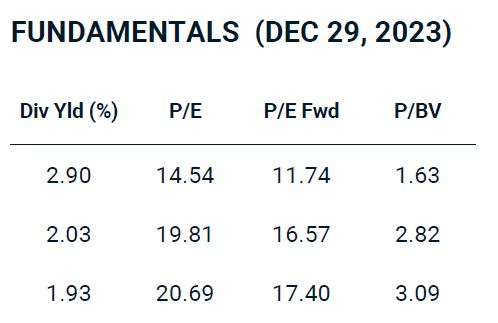
6. How much MSCI EM Index ETF for our portfolio ?
Though, these Emerging Markets ETFs invest in 24 developing countries, the developed markets are very important too. Also, around 30% of the MSCI EM Index ETF is invested in a single country.
So, there is an ample scope for diversification with other ETFs outside the MSCI EM Index. You can invest in developed markets, specific sectoral ETFs, individual countries, etc.
An example portfolio can be 85% MSCI World Index ETF and 15% MSCI EM Index ETF
7. Other options for Index ETFs in Europe?
Here is a list of other Indexes which can complement the MSCI EM Index. You can invest in the various ETFs tracking these indexes.
- MSCI World Index, which invests in around 1,500 companies across 23 developed countries.
- S&P500 Index, which invests in top 500 large-cap U.S. companies and covers approximately 80% of available market capitalization.
- Nasdaq-100 Index, which invests in 100 of the largest non-financial tech companies listed on the Nasdaq Stock Market.
- Dow Jones Industrial Average Index, which invests in 30 U.S. blue-chip companies and covers all industries except transportation and utilities.
- Euro Stoxx 50 Index, which invests in 50 largest companies in the Eurozone and covers 20 sectors.
- FTSE 100 Index, which invests in the top 100 companies listed on the London Stock Exchange.
8. References
- MSCI Emerging Markets Index
- What Is an Exchange-Traded Fund (ETF)?
- A Brief History of Exchange-Traded Funds
- International ETF: What It is, How It Works, Example
- 10 ETF Concerns That Investors Shouldn’t Overlook
- ETF vs. Mutual Fund: What’s the Difference?
- Index Fund vs. ETF: What’s the Difference?
- Building an All-ETF Portfolio
If this article was useful, please leave your feedback below
Disclaimer
- Any finance-related information shared is not professional legal, tax, or investment advice.
- The information provided is of an educational and general nature and is not investment advice within the meaning of Articles L. 321-1 and D. 321-1 of the French Monetary and Financial Code.
- Investment carries risks of loss and past performance does not guarantee future performance.
- For all professional advice, please consult a certified financial planner, CGP, CIF, tax consultant, etc.

